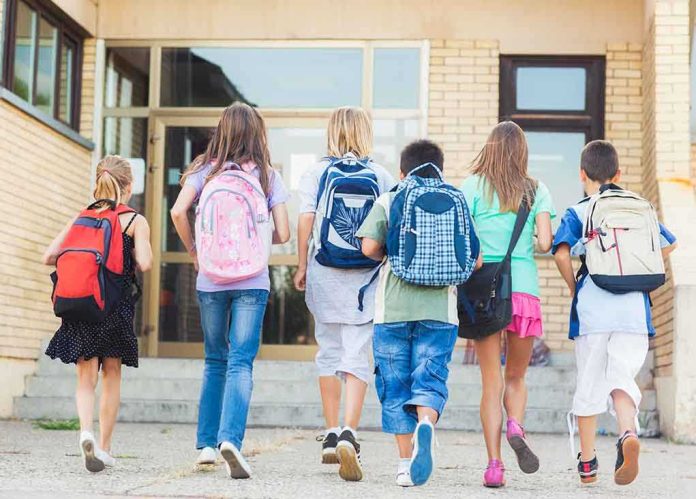
School surveillance companies are quietly watching American children around the clock—even in their own homes—raising urgent alarms about the erosion of privacy and parental rights.
Story Snapshot
- 86% of school safety tech firms now monitor students 24/7, including on personal devices and after school hours
- Major new study exposes the lack of transparency and unchecked power of these companies over family privacy
- Parents, students, and privacy advocates express deep concern about intrusive data collection and opaque algorithms
- Calls intensify for accountability, transparency, and restoration of constitutional protections in public education
Widespread 24/7 Surveillance: A New Reality for U.S. Students
A groundbreaking UC San Diego study published in July 2025 reveals that nearly nine out of ten school safety technology companies are monitoring students around the clock—even on their personal devices, and even outside of school property. This surveillance is not limited to school-issued laptops or during class hours. Instead, it extends into students’ homes and private communications, collecting data such as private messages, search histories, and more. Parents who thought they could control what happens in their own homes are learning that third-party vendors may have more access to their children’s lives than they do.
According to the study, school districts often enter contracts with these surveillance vendors without fully understanding the technical details or the extent of data collection. Many contracts lack strict oversight or meaningful input from parents or students. The companies themselves rarely disclose how their algorithms work, how often they make mistakes, or what happens to the data collected. This absence of transparency leaves families in the dark about who is watching their children, what is being recorded, and how this information could be used or misused in the future. For many, these practices cross a line, undermining trust in public education and raising serious constitutional questions.
Historical Roots and the Expansion of Digital Monitoring
The push for digital monitoring in schools began in the 2010s as a response to high-profile school shootings, cyberbullying, and concerns about student mental health. The COVID-19 pandemic accelerated the adoption of online learning tools, and with it, surveillance technologies that promised to keep students safe in a virtual environment. What started as a targeted response to specific threats has now ballooned into a sprawling, unregulated industry. Today, these tools are embedded in both school-issued and personal devices, tracking students’ activities well beyond the classroom. This mission creep has expanded the reach of school authorities and their contractors far into family life, often without informed consent.
Legislative mandates—such as California’s SB 906, which requires threat reporting and school safety plans—have fueled further adoption of these surveillance platforms. While schools argue they need these tools to prevent violence and comply with state laws, privacy advocates highlight the danger of overreach. Rather than targeted monitoring based on credible threats, blanket surveillance now sweeps up all students, regardless of risk. This indiscriminate data collection not only violates basic privacy principles but also erodes the presumption of innocence for every child in the system.
Stakeholder Concerns: Parents, Students, and Constitutional Rights
Parents across the political spectrum are voicing strong opposition to these developments. Many conservative families, in particular, see the normalization of 24/7 surveillance as a direct assault on parental authority, family values, and fundamental rights guaranteed by the Constitution. Students, too, are increasingly aware that their every online move could be scrutinized—not just by teachers, but by unknown company employees or automated algorithms. Privacy advocates warn that these tools can produce false positives, disproportionately target certain groups, and create a chilling effect on free speech and expression. The lack of clear channels for recourse or oversight only deepens frustration and mistrust among families who expect schools to act as partners, not as surveillance arms of the state.
Meanwhile, the power dynamics remain heavily skewed: school districts often lack the technical expertise to evaluate these systems, while companies guard their algorithms as proprietary secrets. With little public information available about error rates or the ultimate use of collected data, accountability is minimal. Many companies even declined to provide basic disclosures to the UC San Diego research team, citing confidentiality or competitive concerns. This opacity leaves parents with more questions than answers, and little recourse if their child’s private information is mishandled or misinterpreted.
Calls for Reform and the Path Forward
The publication of this first-of-its-kind, peer-reviewed study has intensified calls for accountability and reform. Lawmakers, school boards, and advocacy groups are demanding greater transparency from both vendors and public officials. There is growing recognition that the unchecked spread of surveillance technology threatens the very principles of limited government and personal liberty that form the foundation of American society. In the short term, parents and privacy advocates are pressing for audits, opt-out provisions, and clear disclosures. In the long term, there is a push for legislative action to restore the balance between safety and privacy, ensuring that constitutional rights are not sacrificed in the name of security.
Schools’ safety tools are spying on kids — even at home https://t.co/hiYweKdC9y
— ConservativeLibrarian (@ConserLibrarian) August 25, 2025
While the debate over school safety and responsible technology use will continue, the facts are clear: American families deserve to know who is watching their children, and to have a real say in how far that monitoring goes. The preservation of privacy, parental rights, and constitutional protections should never be up for negotiation—especially in the place where our children learn what it means to be free citizens.
Sources:
Walker Elementary School Comprehensive School Safety Plan
Iftin Charter School Comprehensive School Safety Plan
San Diego County Office of Education: School Safety



